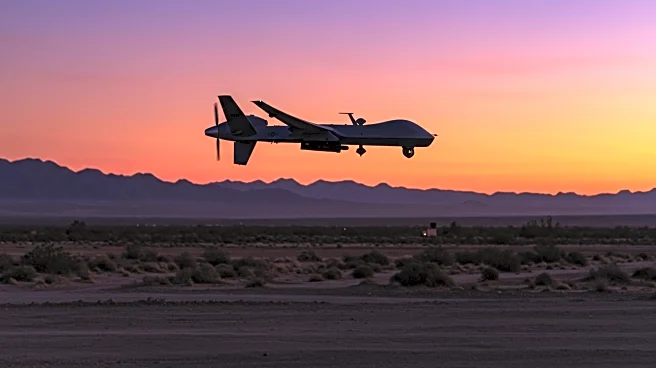What's Happening?
The U.S. State Department has approved a $346 million arms sale to Nigeria, pending Congressional approval. This sale includes bombs, rockets, and munitions aimed at bolstering Nigeria's military capabilities against terrorist organizations. The Nigerian military is currently engaged in a prolonged battle against jihadist groups such as Boko Haram and the Islamic State West Africa Province (ISWAP) in the northeast region. These groups have intensified their attacks, overrunning military bases and seizing weapons. The Nigerian Air Force recently conducted airstrikes near the Nigeria-Cameroon border, reportedly killing over 35 jihadists. This operation was part of ongoing efforts to stabilize the region and support ground troops. The insurgency, which has lasted 16 years, has resulted in over 40,000 civilian deaths and displaced more than two million people.
Why It's Important?
The arms sale signifies a strategic partnership between the U.S. and Nigeria in combating terrorism. It highlights the U.S. commitment to supporting Nigeria's military efforts against insurgent groups that threaten regional stability. The sale could enhance Nigeria's operational capabilities, potentially reducing the threat posed by jihadist groups. However, it also raises concerns about human rights, as past airstrikes in Nigeria have resulted in civilian casualties. The U.S. State Department has emphasized the importance of protecting civilians and ensuring accountability for any human rights violations. This development could influence U.S. foreign policy and military aid strategies in Africa, impacting regional security dynamics and humanitarian conditions.
What's Next?
Pending Congressional approval, the arms sale will proceed, potentially strengthening Nigeria's military operations against insurgents. The U.S. will likely continue to engage with Nigerian officials to address human rights concerns and ensure transparency in military operations. The Nigerian military may intensify its efforts to reclaim territories and stabilize the northeast region. International observers and human rights organizations will likely monitor the situation closely, advocating for civilian protection and accountability in military actions.










